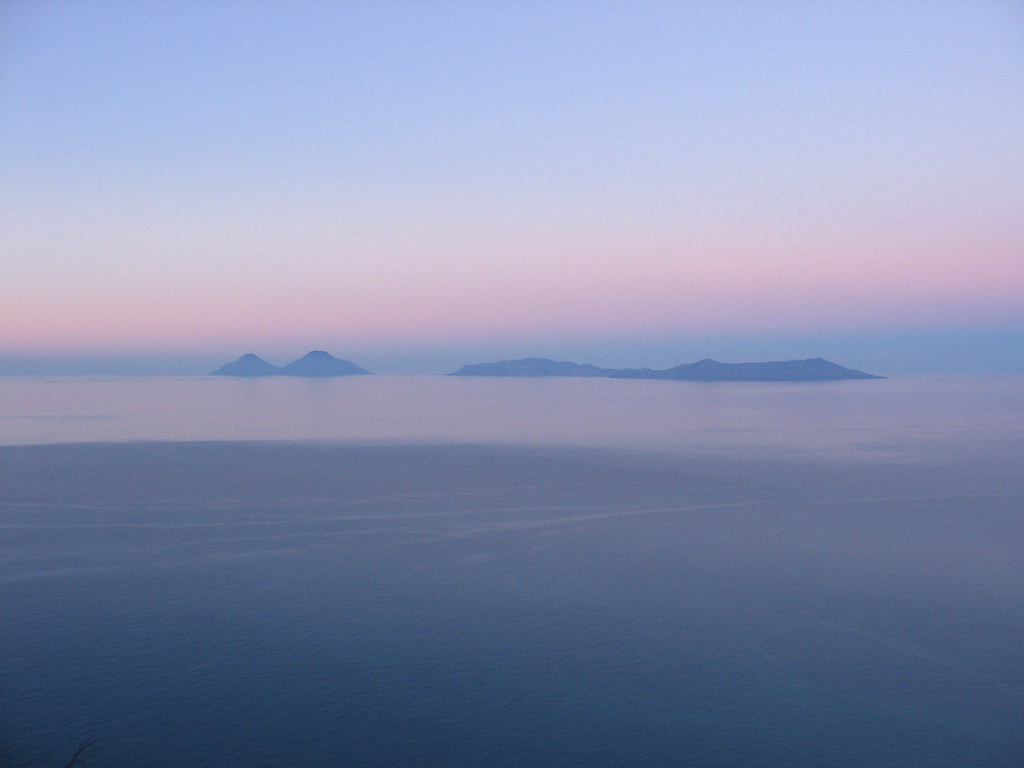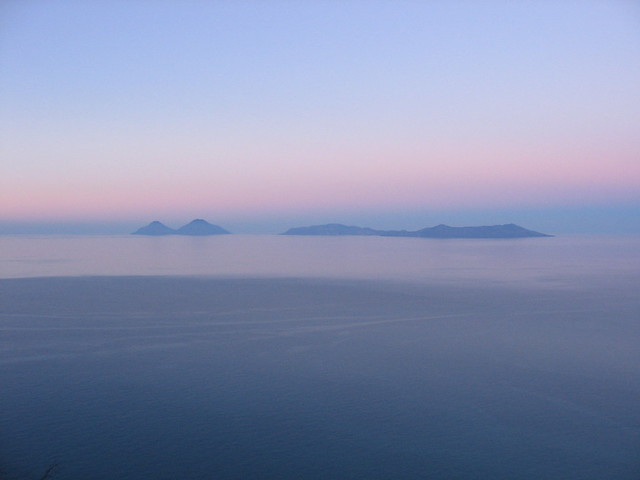.

Islands of Salina, Lipari and Vulcano, in the Aeolian archipelago, viewed from Piraino: photo by ninoravi, 2007
and always to this desolate
shore
I come to encounter
you
unveiling
your fragile
light
cuttlebones
on the beach
and dead fish
with innocent round eyes
and rosy lips
already
in the pale conch
trembles
the blue distant
dawn

Islands of Salina, Lipari and Vulcano, in the Aeolian archipelago, viewed from Piraino: photo by ninoravi, 2007
After an original from Curzio Malaparte: Fughe in Prigione, 1936



11 comments:
Beautiful, Tom.
Thanks, Don. Sixth sense. This one had you in mind.
Tom,
Yes, beautiful, picture and words and picture. Sun just now coming up above eucalyptus on southeast edge of Mesa, move southward now at a rather alarmingly rapid rate ("oh dear me"). . . .
10.18
light coming into sky above still black
ridge, golden-crowned sparrow’s dear me
in foreground, wave sounding in channel
approaches constructing form,
surface refraction of
descriptive term parallel to
it, not that, picture
grey-white clouds reflected in channel,
shadowed green pine on tip of sandspit
Lovely, Steve.
All I can say to your golden-crowned sparrow is:
you said it.
(A spot of blue poking through cloud, as that is said...)
(By the way, re. the "setting" here: as a result of his penchant for getting on the nerves of those in power, Malaparte spent much of the 1930s in exile and house-arrest in various remote spots... "Fughe in prigione" -- "flight in prison" -- plays ironically against the expectation of "flight from prison"... the milieu here is the isle of Lipari, in the chain of volcanic isles off the north coast of Sicily, the Aeolian archipelago...)
Tom, this moved me -- at work no less. Beautiful. Metax.
This is frightening in the best possible way
I would love to hear this read aloud.
I've just spent some time reading about the Aeolian Islands, which I've never visited. Although I wouldn't want to be a prisoner there (or anywhere), they do look amazing in these photos and seem to be incredibly beautiful.
Robb, I am moved to have moved you, at work no less.
John, yes, good scary was the intended tenor. (My inner contralto seems to have been put out of action by shrapnel.)
Curtis, yes, one imagines Malaparte's classical sonorities vocalized by night, perhaps in the open air natural amphitheatre situation created by one of those volcanic craters. Just so long as it wasn't erupting at the time (as Stromboli is wont to do).
About the beauty of the locales, those were my thoughts too... can't think of a more beautiful set of places in which to endure internal exile. Stark, austere, grand. Though again, Stromboli... one recalls that Rossellini film (Stromboli, Terra del Dio) in which he makes Ingrid Bergman toil her way up that bleak mountain of hot cinders. The tremendous natural symbolism of the volcano pretty much overwhelms the film's rather delicate story. And I must say, what a way to treat your magnificent main squeeze. As Stephen's charming golden-crowned song sparrow might say, Oh dear!
But while thinking about it a bit, I must also say the fishing sequence in the film is unforgettable.
(Alberto Moravia, by the way, wrote a novel in which a thinly disguised version of Malaparte seems to be taking his exile rather comfortably, "strolling about the beach with his women," etc. My first thought about that -- knowing a bit about writers -- was: Moravia was jealous!)
Several flights up I am moved reading the poem. At work. Words. No less. No more. Great poem.
and always
.
.
Beautiful.
Post a Comment